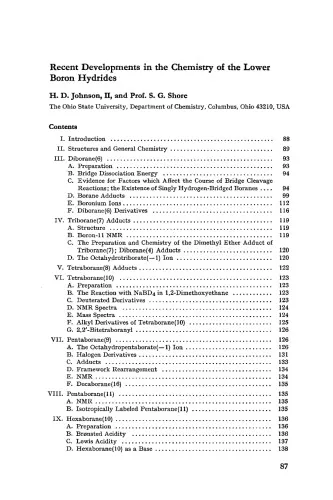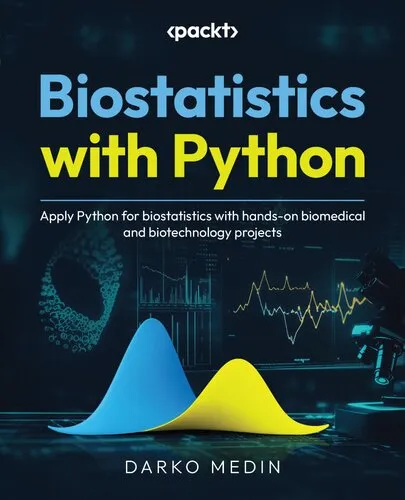Carbohydrate Polymers
4.4
Reviews from our users

You Can Ask your questions from this book's AI after Login
Each download or ask from book AI costs 2 points. To earn more free points, please visit the Points Guide Page and complete some valuable actions.Related Refrences:
Analytical Summary
Carbohydrate Polymerspp.865—871 is a specialized scholarly work authored by Jian Chen, Jing Li, and Bin Li, focusing on the multifaceted world of carbohydrate-based macromolecules. This book stands out for its in-depth discussion on the structure, function, and emerging applications of carbohydrate polymers within both academic and industrial spheres.
Within these pages, readers encounter a meticulous exploration of polysaccharides—natural biopolymers that play essential roles in biological systems, materials science, and sustainable technology. The authors draw upon peer-reviewed research and their collective expertise to elucidate the intrinsic chemistry, physical characteristics, and potential functionalization approaches of carbohydrates, making the text invaluable for chemists, biotechnologists, and materials engineers.
Spanning topics from cellulose derivatives to complex glycans, the content of Carbohydrate Polymerspp.865—871 is organized to help readers grasp not only the fundamental principles but also the forward-looking innovations shaping the future of carbohydrate-based materials. Although specific publication year information is unavailable due to the lack of reliable public sources, the relevance of its scientific discussion remains timeless.
Key Takeaways
Readers of Carbohydrate Polymerspp.865—871 will gain a nuanced understanding of how carbohydrate polymers intersect with both natural and engineered systems, ultimately revealing their transformative potential in various sectors.
The text emphasizes the critical link between molecular structure and macroscopic properties, showing how tailoring carbohydrate chains can yield materials with desired mechanical, thermal, or biological profiles.
An integrated perspective is presented, combining chemistry, materials science, and biotechnology to paint a holistic picture of application possibilities—from edible films to biomedical scaffolds.
Innovations in polysaccharide modifications are outlined, underscoring the importance of environmentally responsible approaches in modern polymer design.
By bridging fundamental science and practical application, the authors equip professionals and academics with actionable insights to advance both research and industry projects.
Memorable Quotes
"Understanding carbohydrate polymers opens the door to creating truly sustainable material solutions."Unknown
"The intricate architecture of polysaccharides is nature's blueprint for versatile functional materials."Unknown
"Future innovations in biomaterials will rely heavily on the intelligent design of carbohydrate-based polymers."Unknown
Why This Book Matters
Carbohydrate Polymerspp.865—871 matters because it bridges the gap between theoretical polymer science and practical, sustainable applications, providing the intellectual toolkit that modern materials science demands.
For researchers, the book synthesizes knowledge from diverse sources to present a coherent framework for polysaccharide innovation. For industry professionals, it suggests pathways to harness renewable resources for high-performance products. These dual emphases make it equally valuable to the laboratory and the design studio.
In a world striving toward sustainability, the role of biopolymer research and polysaccharide applications cannot be overstated. This work serves as both a reference guide and an inspiration for turning molecular science into tangible ecological benefits.
Inspiring Conclusion
Carbohydrate Polymerspp.865—871 is more than a book; it is a catalyst for innovation in the realm of carbohydrate-based materials.
Whether you are an academic researching polysaccharides, a materials scientist exploring biopolymer possibilities, or a professional seeking sustainable solutions, this work offers the depth and clarity you need. Its authoritative tone, grounded in rigorous research, invites engagement, discussion, and the pursuit of new ideas.
Engage with Carbohydrate Polymerspp.865—871 today—read it deeply, share its insights with peers, and discuss its implications in your next project meeting. The future of sustainable material science is being written now, and your participation can make all the difference.
Free Direct Download
You Can Download this book after Login
Accessing books through legal platforms and public libraries not only supports the rights of authors and publishers but also contributes to the sustainability of reading culture. Before downloading, please take a moment to consider these options.
Find this book on other platforms:
WorldCat helps you find books in libraries worldwide.
See ratings, reviews, and discussions on Goodreads.
Find and buy rare or used books on AbeBooks.
1114
بازدید4.4
امتیاز0
نظر98%
رضایتReviews:
4.4
Based on 0 users review
Questions & Answers
Ask questions about this book or help others by answering
No questions yet. Be the first to ask!

















